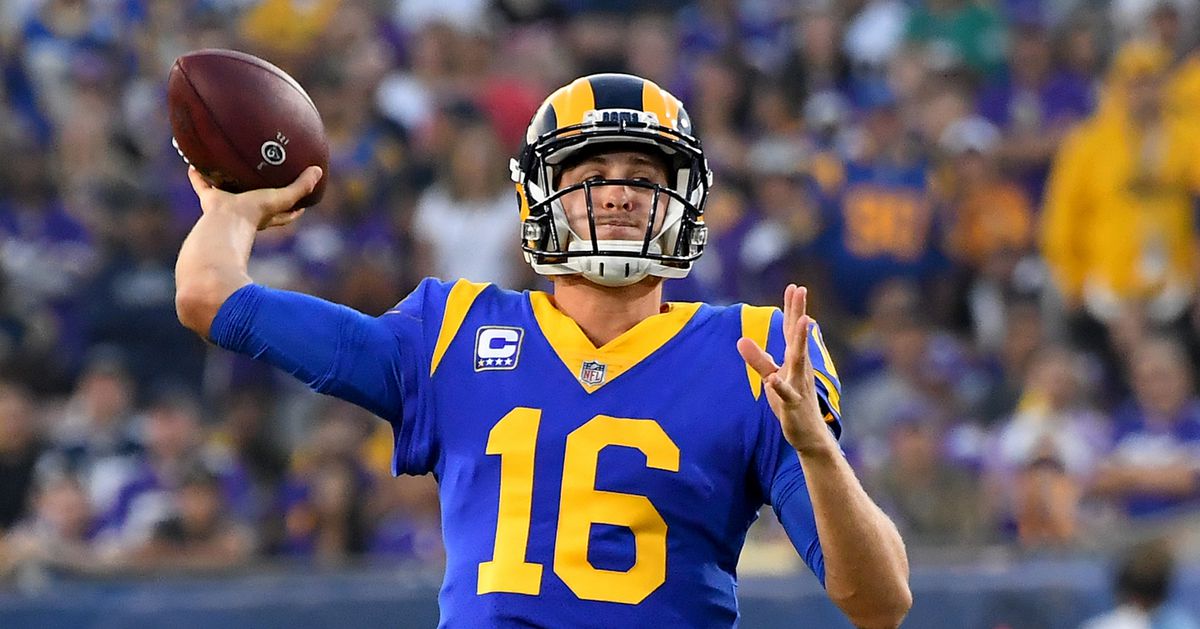Back in May, I approached the first real look at the looming decision the Los Angeles Rams have in terms of extending QB Jared Goff in light of the deal the Atlanta Falcons gave to QB Matt Ryan.
It’s something we’re going to need to start re-visiting more frequently, but I thought it worth updating here. Why? Now after eight games, we’re not only through half of the 2018 season but also halfway through Goff’s rookie contract assuming the Rams apply a fifth-year option on his deal to keep him under contract for the 2020 season.
Much has happened in the first eight games to make us reevaluate the environment around a new deal, but we still haven’t gotten to the most important performances that will really have the most impact on a new deal: late-season and postseason performances.
That said, here are the three major aspects of a new deal and how things have progressed since May.
Goff’s individual performance
More than anything, this will drive the motivation for a new deal from both sides. If Goff has more performances like he did against the Minnesota Vikings in Week 4 and continues to elevate his play overall as he has this year, it will be nearly impossible for the Rams to find a way out of paying him a record-breaking deal.
And really, that’s the framing we need to start considering.
The team around Goff
This one largely revolves around the offensive line as the Rams have locked up the core components of their offense now with RB Todd Gurley, WR Brandin Cooks, WR Robert Woods and WR Cooper Kupp all locked up for at least the next two seasons.
The Rams extended RT Rob Havenstein through 2022 back in August, but he’s the only long-term certainty on the line. LG Rodger Saffold is an unrestricted free agent after this year. LT Andrew Whitworth, C John Sullivan and RG Austin Blythe are up after next year. Between Whit, Saffold and Sullivan, I’m not sure how much the Rams are willing to commit to any long-term given their age. And while rookie draft picks Joseph Noteboom and Brian Allen offer some potential to plug in, they remain projects that have yet to actually verify their competency.
So the real thing to consider here is if the Rams are prepared to offer a major contract to Goff in 2021, how does the line that will protect that investment look starting in that season and how much will the sheer cost of Goff’s deal impact the ability to re-sign those core offensive weapons?
The market
I’m combining the two aspects here to consider both the general NFL market and the QB market that will develop for 2021.
There are two quarterbacks who have crossed the $30m average per year (APY): Ryan and Green Bay Packers QB Aaron Rodgers who signed a four-year extension in August. Minnesota Vikings QB Kirk Cousins’ three-year deal he signed this year is for $28m APY, but all three years are fully guaranteed. And San Francisco 49ers QB Money Contractalot got a five-year deal at $27.5 per, but had just 35.4% of it guaranteed, the lowest of the major deals (Rodgers at 58.7%, Ryan at 63% and Cousins at 100%). So the four of them have collectively reset the bar for the QB market which isn’t likely to undergo a major change next offseason.
Instead, prepare thyself for the great QB Remaking of 2020. The following quarterbacks are on deals that expire after next season: New Orleans Saints QB Drew Brees, New England Patriots QB Tom Brady, Seattle Seahawks QB Russell Wilson, Pittsburgh Steelers QB Ben Roethlisberger, Los Angeles Chargers QB Philip Rivers, Tennessee Titans QB Marcus Mariota and Tampa Bay Buccaneers QB Jameis Winston. So yeah…
Maybe more relevant to the immediacy of thinking about Goff’s fortunes? The Rams’ need to find more competency from the backup to Goff, as Sean Mannion is scheduled to become an unrestricted free agent.
Beyond that though are the considerations that Goff will be signing a deal for a market that will take shape under the next collective bargaining agreement. Will it continue to suppress the costs of rookie deals? Much has been made of the idea that the Rams have developed their window of success on the back of the talents they had on rookie deals. Those deals have all but been replaced at the key value positions save for Goff at quarterback and Whitworth’s successor at left tackle (unless it’s Noteboom). If the new CBA either maintains that strategic discrepancy or expands on it, the pressure to draft talented quarterbacks early will only expand as the salary cap does so as well. So consider the early trajectory of someone like Clemson Tigers QB Trevor Lawrence in light of what we’re imagining two and a half years out.
But also, keep in mind the cost alternatives for Goff. Not trying to reinvigorate the old Barnwell trade hypothetical, but the obvious backing Goff enjoys now comes at about 25% of his market value. Once that hits 100%, the alternatives will be, well, without restriction. If Goff is going to get a top tier contract, the question is one of Goff v. any other quarterback. It’s not necessarily one of abandoning our favorite system QB. It’s more a question of who will be able to win the biggest games in this window when you are paying him along the lines of the Rodgers and Brees of the NFL.
Plenty of football to come. Plenty of moments in big games that will help decide how easy or difficult this decision will be.
But halfway through Goff’s rookie deal, it looks like the scope of the decision will affect not just the Rams’ future but the entire market of the NFL and depending on how Goff plays the next two and half seasons, it may just affect the postseason outcomes of the Rams let alone any other teams they face as well.
